The Critérium du Dauphiné is often one of the best races of the year. Mix the start of summer with Alpine roads and a great startlist and you have all the ingredients for a great race. Crucially there’s the proximity to the Tour de France and the sense that actions and events in this race will carry through into the next month, a tale of travel rather than arrival.
Once again the week provided plenty of sport and speculation, daily action and clues about the Tour de France but the highlight was Stage 6 to the Vercors plateau.
This was supposed to be a transition stage, one of those days where a small breakaway can fight for the win while the big names sit tight ahead of the set-piece Alpine sunmit finishes. The rulebook was ripped on the day, its pages turned to pulp by the downpour on the morning. We often talk about rain “dampening spirits” but as much as it can demoralise some it enlivens others.
The day started with a maxi-breakaway packed with many big names but when it was caught things didn’t calm down. Tony Martin and Vincenzo Nibali took off and the Italian surged away doing 20km solo, madness in the early phase of a stage. He was caught but tried again, this time joined by Rui Costa, Tony Gallopin, Tony Martin and Alejandro Valverde. Behind it was too generous to talk of bunch, the group with Tejay van Garderen and Chris Froome and the other GC riders was a huddle of survivors grouped in the rain and at one point Tinkoff-Saxo started chasing but they didn’t have anyone for GC, perhaps it was just to contain rivals Astana with Nibali up the road?
Nibali had looked the strongest all day and attacked on the final climb but Rui Costa played it cool, rode across and ditched the Italian to win the stage. It was one of those days where the stage result was almost incidental. Rui Costa won but the race was turned upside down with Nibali assuming the race lead and the GC candidates coming in almost one by one.
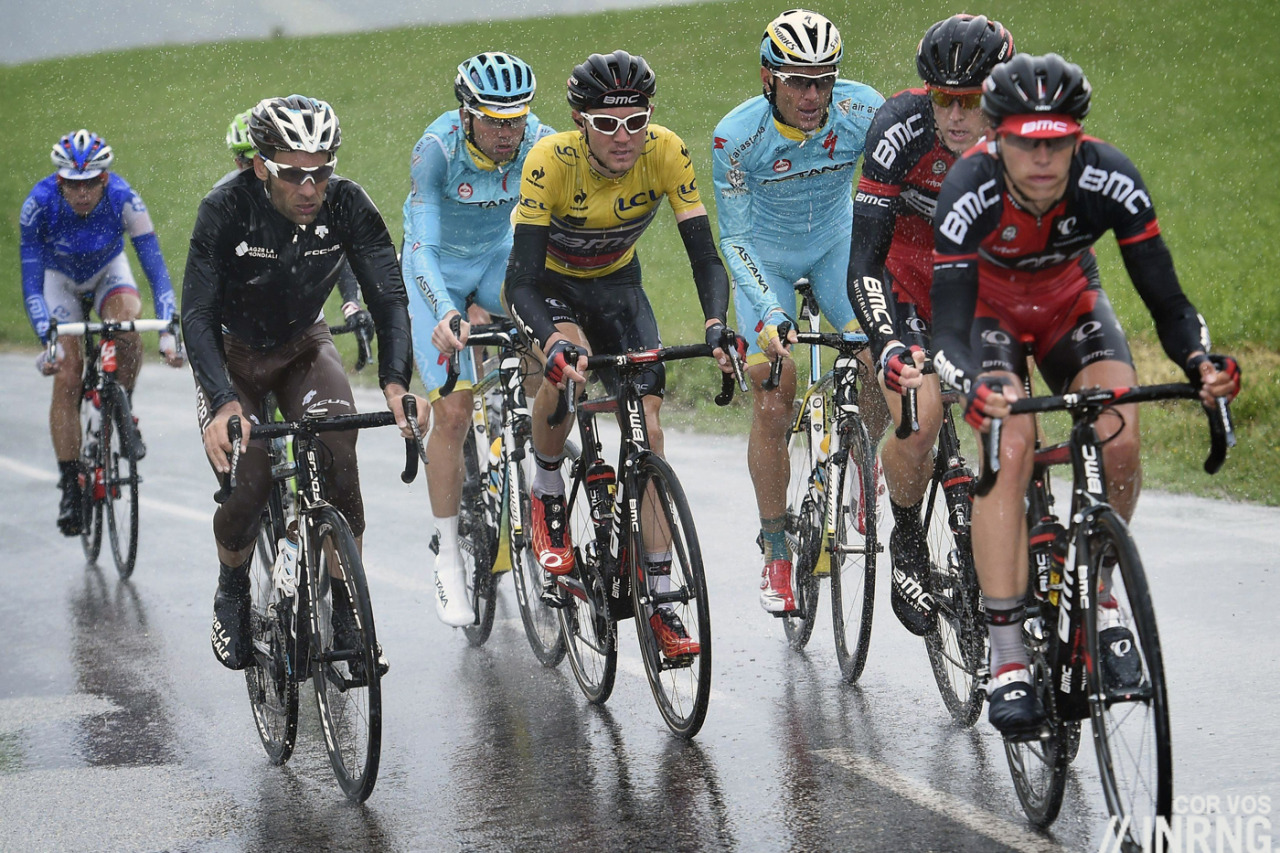
Mid-Mountain Mayhem
There’s a thesis to write on why mid mountain stages are better than the high mountains. Mainly because the long mountain passes are steady, linear affairs where everyone knows they can ride to pre-determined W/kg outputs. A medium mountain stage offers ambush country, smaller roads with more climbs and descents and a greater chance to get away. It doesn’t always hold true but it did here.
With Hindsight
Rui Costa winning and Vincenzo Nibali in yellow? It turned out to be the exception that proved the rule, two riders having a good day in a season didn’t work out for them. Rui Costa is a great rider who can hang with the best but wins come rarely while Vincenzo Nibali probably spent half of the year cautiously opening his mailbox in case a strongly-worded letter arrived from Alexandr Vinokourov.
As good as Nibali’s ride was this day he paid in cash the following day, cracking on the nasty climb of the Côte des Amerands and losing four minutes to Chris Froome. But that’s panache for you, in order to deliver impressive wins you have to lose big sometimes too otherwise it’s boring.
Simon Yates took off on the Gorge de la Bourne, a stunning road cut into cliff while Tiesj Benoot, the first year pro and revelation of the spring classics was eighth, proof of versatility and endurance
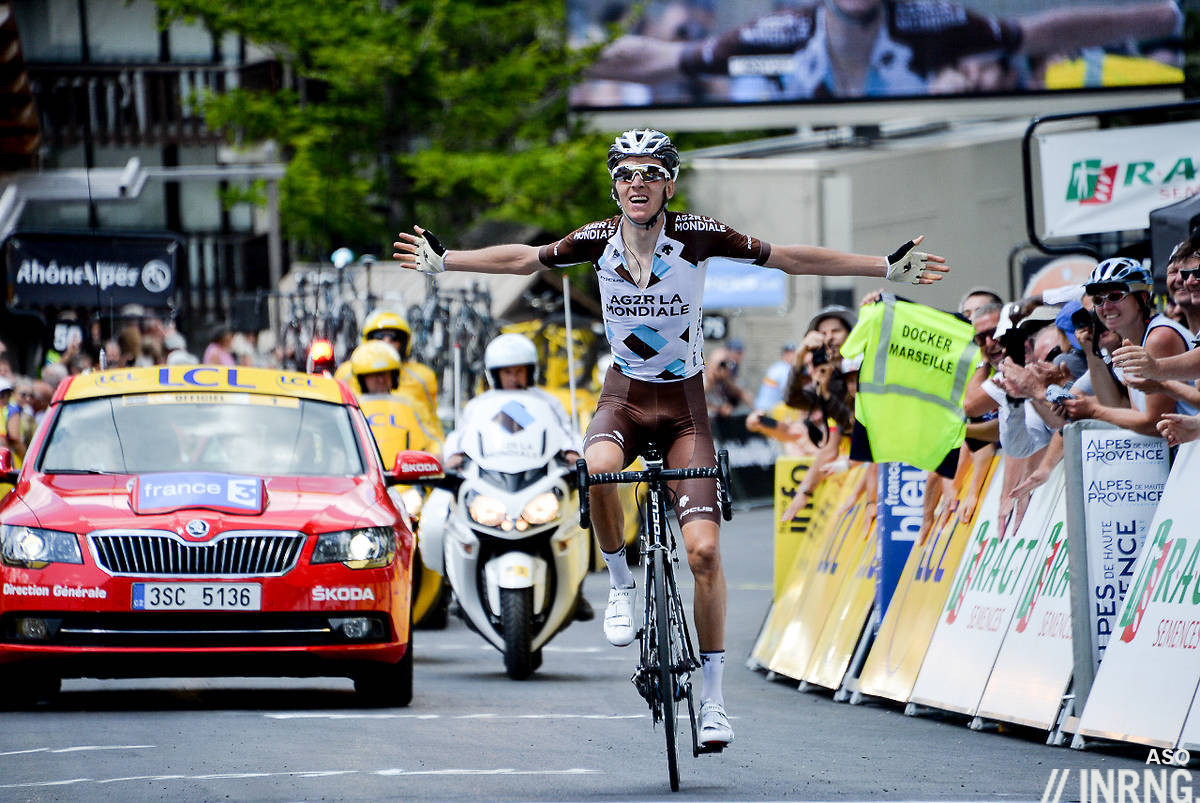
Romain Bardet crashed near the finish and said the injuries from this were a burden in the Tour de France but he still finished the race with a stage win after his amazing descent of the Col d’Allos. On Stage 7 we saw Bardet being relayed by Alexis Vuillermoz who’d win a stage of the Tour de France. Indeed looking at the race as a whole BMC Racing won the team time trial which they did in the Tour de France too, the Dauphiné win put Rohan Dennis in yellow. The opening stage saw a clever win from Peter Kennaugh and Nacer Bouhanni took two stage wins.
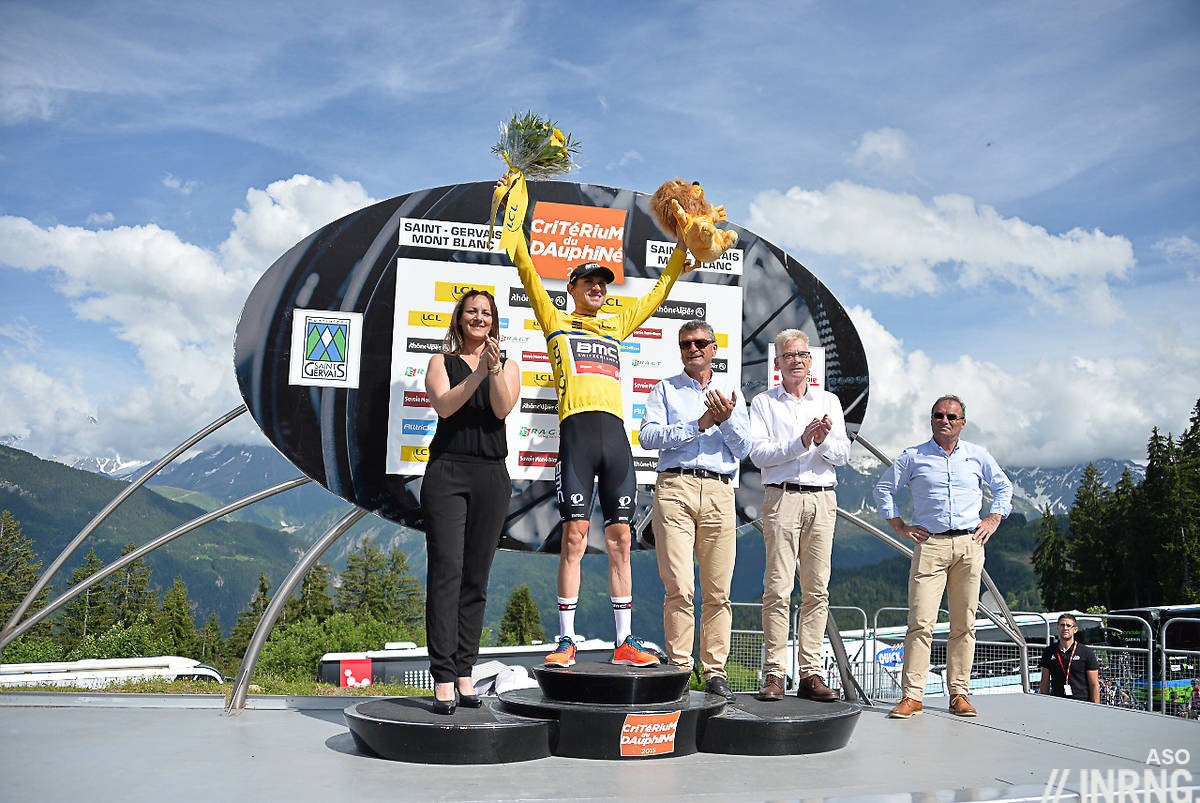
The last two days saw Chris Froome and Tejay van Garderen duelling, van Garderen having reclaimed the race lead after Nibali cracked but Froome was climbing faster and, helped by time bonuses, dispatched him on the final day.
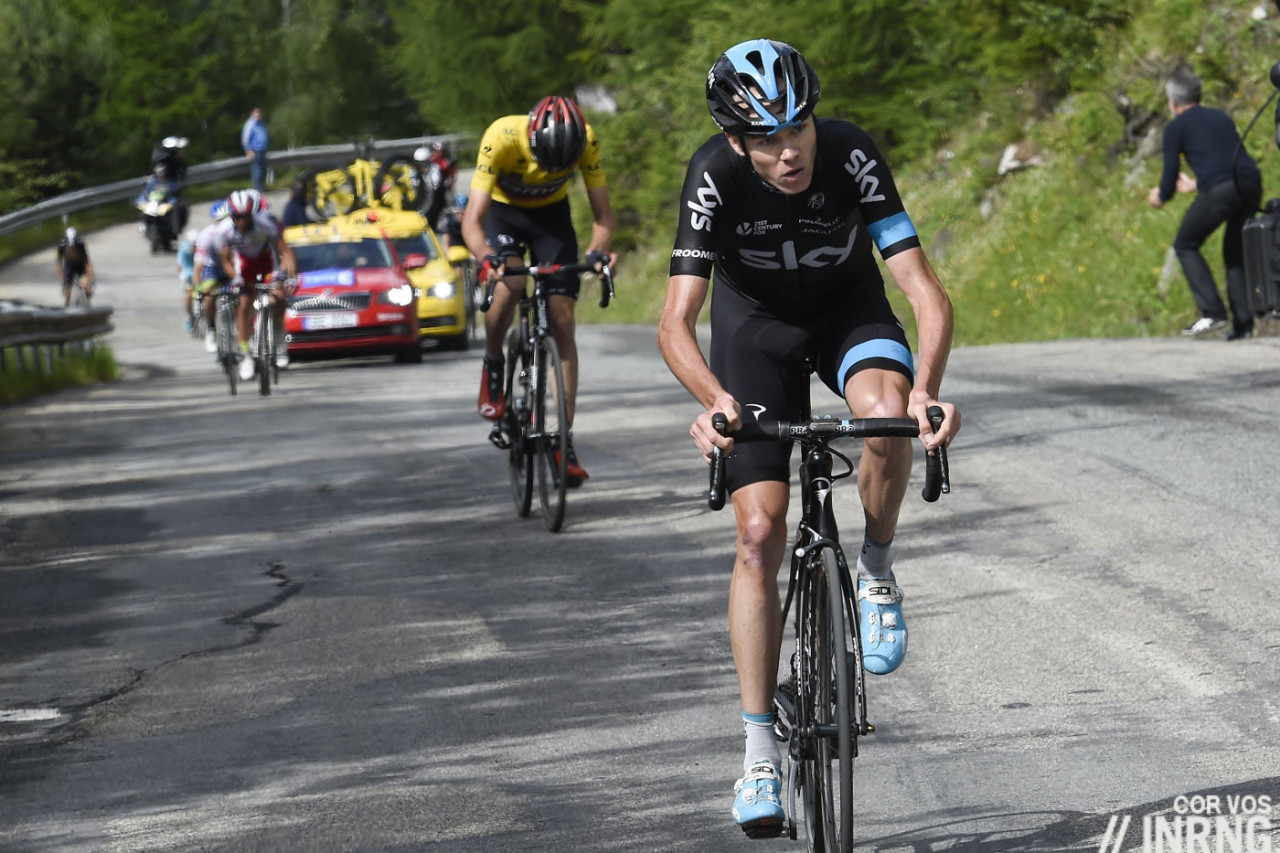

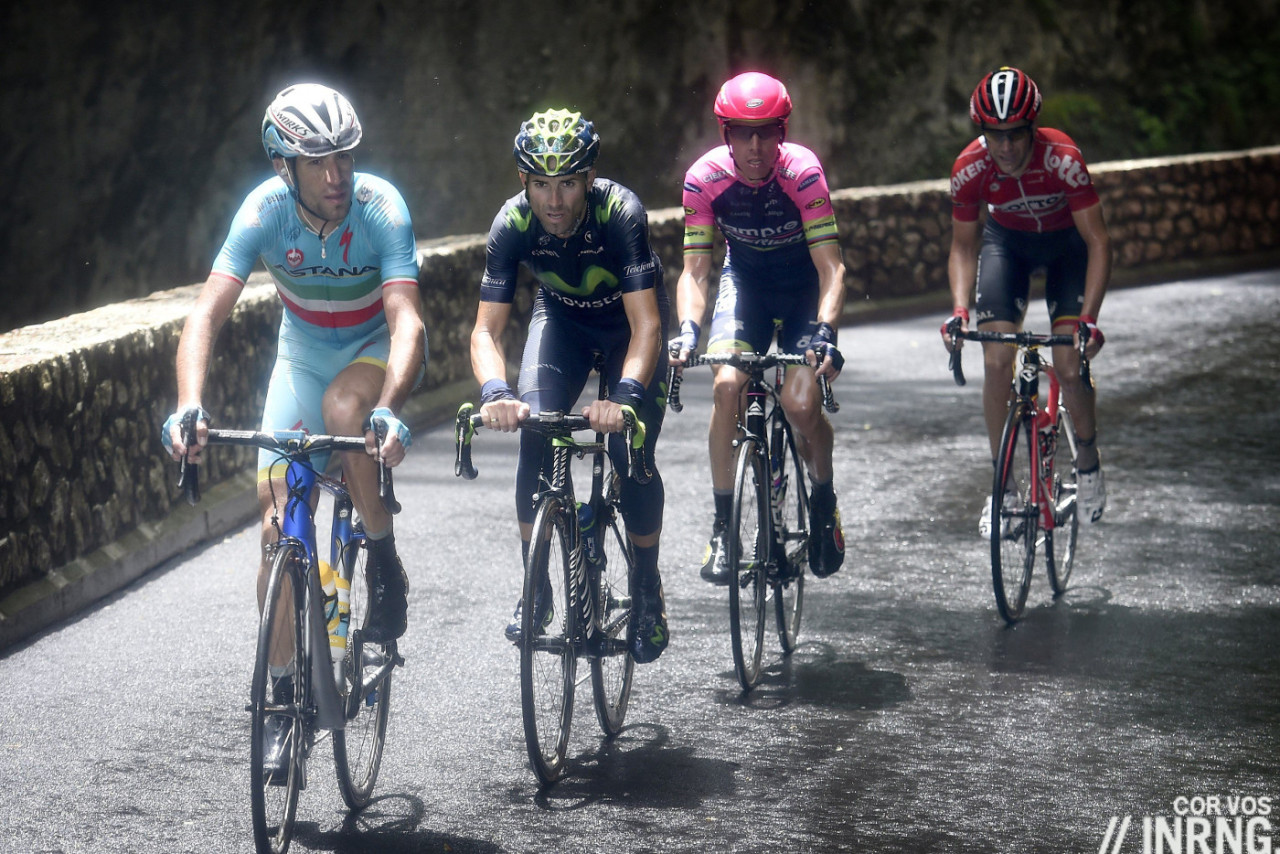
Loved Dauphine this year. It was heart crushing to see TvG fight and struggle and finaly get ditched, even tough everyone knew it would happen, TvG included.
That photo of an exhausted (and emotionally-wrecked?) TJVG leaning up against a wall, head down, after he lost the race, said so much. I’m not a TJVG fan but it was quite something.
I too find it hard to root for TvG but the way he wears his heart on his sleeve makes him a more compelling figure to follow.
I had forgotten what a belter that race was… really hope that Quintana starts doing more of the traditional warm up races, would be great to see some early scuffles between him and Froome next year.
“A season [that] didn’t work out” when you win a Monument, the Nats, arguably the best Tour stage taking 4th in final GC (which means *not cracking* after an even braver display of panache, compare with final 12th place in the Dauphiné), plus a couple of historical semi-classics to round it up? You sure expect a lot from the guy ^__^
Yeah, we all got what you mean, the disappointments and the Vuelta thing have impressed so much that one can easily forget the ups, but, hey, in a previous post people are debating if GVA had a *great* (as you defined it) or a *pretty damn good* season while winning a Tour stage, a Tirreno one and… what else? the Belgium Tour? o__O
Relative expectations and whatever, but actual victories should also have at least some weight when judging a rider’s season.
Nibali kept salvaging results. Others might donate a kidney for these but he’s one of the best paid and the results didn’t quite meet expectations (or hopes?). Fascinating to see what he does next year.
I really don’t think that GVA is *not* well paid, albeit nowhere near Nibali (nobody expects him to make a top 5 in the Tour, either).
And people expect him to deliver victories on the pavé, or at least other Classics and semi-classics throughout the year, his team excluding Gilbert from those races, for example. Being used to see him not delivering is enough to make a “great season” out of a couple of victories? He’s expected to make the jump from contender to winner, and he’s not doing it. Some might expect more from him in the Worlds, like one could expect more from Nibali in the Tour.
Nibali indeed *salvaged* his Tour, and quite impressively so (not many expected him to be able to make the top 5, at the beginning of the third week).
Though, his autumn isn’t about salvaging results, it’s about winning.
FWIW, in a career perspective winning a Monument is even better than another (quite improbable) Vuelta win or some Vuelta stage/final podium.
I’d agree with you if he hadn’t won the Lombardia, all the rest equal, maybe even swapping Lombardia’s victory with, say, the Giro dell’Emilia, or the Amstel, or the final GC of Dauphiné, something like that. But looking at things *as they are*, he got a decent year.
Sure, I’m utterly unsatisfied with the way he and Slongo use to manage the first part of the season, but that’s a choice they make and a risk they take: if we speak about expectations, then it’s highly unfair to expect anything different while they decide to work like that. More than for better results, I’m hoping for a different attitude in that sense.
All in all, IMHO neither GVA nor Nibali had a great season nor that bad a season. GVA was often in the mix but couldn’t deliver much, Nibali on the contrary was often on the backfoot but could find a handful of top level performance that made for high-profile results.
I expect, and hope, to see a bit more of the late season Nibali next year. He’s doing the Giro for a start and so should be in good form at the Ardennes classics, maybe followed by a late season peak thrown in too depending on if he does the Tour or not. I wouldn’t be surprised at all if he won Liege-Bastogne-Liege next year. Then when you get a palmares with all the Grand Tours and two monuments any comparisons with GVA can go out the window!
I fail to understand how GVA’s palmares could ever be compared to Nibali’s.
Easily: GVA’s palmares are not as impressive as Nibali’s.
Whilst not disagreeing at all with your overall argument, those “historical semi-classics” are now an absolute crock – like most of the rest of the Italian races – and aren’t in the same class or category as the Tour of Belgium which, though hard enough and good enough in itself, is still no great shakes.
“‘historical semi-classics’ are now an absolute crock”?!? Big statement. Let’s hear how they’re absolute crocks…
I get what you mean, and I thought it was rather clear, from what I wrote, that those races were just the icing on the cake (whereas the Tour of Belgium provided half of GVA victories this year).
That said, I think that the Tre Valli is still worth the Tour of Belgium from pretty every point of view (starting from the UCI category – they’re both HC).
The Tre Valli – this year – has had several riders in the mix who are actually competitive when winning on a WT level is concerned: Nizzolo, Pinot, Felline, Elissonde, Sbaragli, Mentjes were in form and up there in the finale trying to get their victory option (let’s leave aside the good share of old glories like Rebellin, Brajkovic, Cunego, Schleck, Gavazzi, Pellizotti…).
The Tour of Belgium was rather about *very* young guns, old champs and a bunch of unknown guys, most of them trying to make amends for a disappointing season or to score a lucky strike: have a look to the final GC, the most competitive riders were under 23 or such – besides, Boonen and Démare were disputing each other most stage wins! I guess you may have confused it with ENECO Tour, which was very fine, indeed.
Moreover, a couple of points need to be addressed: what was impressive wasn’t just the single race, but the fact that Nibali made four podia (and the worst result was 5th, making the winning break) out of five semi-classics he took part in during the second half of September. The level of those races was generally low, but it’s not easy at all to be that steadily on the front, especially when one-day races are concerned. Contador took part in a good number of lesser (absolutely *lesser*) one-day races throughout his entire career, but I think that *in the whole* he’s accumulated at most some six or seven top-5 placements in that sort of races, be them classics, semi-classics or whatever. Not to speak of Froome (who has abandoned the exercise in the last couple of years). It’s not like, you’re stronger, you authomatically make a great result.
The second point is about those specific races being far from adequate for Nibali’s skills (whereas the ToB was quite suited to GVA), much less than Lombardia or, say, Milano-Torino: what impressed was the way he always had to invent something peculiar to be on the front, more or less *outlandish* long-range attacks, bold bending and the likes. That’s why I think citing them is needed to stress how different was his autumn from his Tour: the Tour was about salvaging something, whereas the end of the season was more of a classy winning streak.
Re: Nibali – “But that’s panache for you, in order to deliver impressive wins you have to lose big sometimes too otherwise it’s boring.” I will always prefer seeing someone race to win instead of racing not to lose. A highlight of 2015 for me was his win at Lombardia – but I’m getting ahead of you here, sorry.
Thanks. Had almost forgotten what a cracker it was this year.
Quite apart from Critérium du Dauphiné being an excellent race, I have to say that road next to the river in the lead photo was one of the most beautiful I’ve seen in pro cycling. That stage was a joy to watch not only for the quality racing.
it did make me think ‘hmmm maybe these Yates boys really have something’…
I have to lump them in together as I still haven’t figured out which one is which, luckily they both appear to be pretty handy
I think one of them (Simon?) is more of a potential GC man and one (Adam, did he win San Sebastian?) more of a climber/puncheur Valverde type. But I don’t think theres much in it, and they are both very good at only 22.
Also, Adam has a scruffy beard while Simon remains clean shaven.
Noooo! you cant hang identification on something as transient as face fluff 🙂
Usually, SImon wears whIte shoes and glasses, Adam wears blAck shoes and glasses that aren’t white. I’m unsure whether that’s deliberate and if so, for whose benefit.
It’s simple. The one up the road is Admon, the one in the peleton is Siam, or is it the other way round?
Is it just me or did anyone else think that lead image look like something out of a video game?!
+1. Grand Theft Dauphine
please, not the Gerrans discussion again…
Stage 6 was one of the best stages of the year. It had everything I love about cycling – beautiful roads, unpredictable weather, full gas balls out racing that was unpredictable. Great theatre.
Bardet’s descent of the Col d’ Allos was perhaps the best 10 minutes of cycling viewing all year. I was on the edge of the sofa in awe and fright. Fantastic ride on a serpentine luge run all captured brilliantly by the death defying moto-camera. While I wish I could climb like an Angel of the Mountains, I really wish I could descend with the skill and courage that Bardet displayed.
Likewise. I’ve always been a relatively competent climber, but one too many nasty crashes has left me somewhat of a coward when it comes to descending – particularly on steep corners. Bardet’s riding that day had me transfixed, mouth agape and palms sweating. Sure, watching Froome somehow find another gear and kick partway up a lungbusting climb is an impressive display of athletic endeavour, but the skill the great descenders exhibit in barelling down Alpine roads, hitting apexes at 80kmh, is truly awe inspiring.
Yes, good point.
Some of the season’s highlights have been the descents, think Sagan of course and Nibali.
But this was alongside them too.
In fact, the entire eight stages was non-stop action.
Time bonuses helped to light-up this race actually.
What about Lombardia? Perhaps there is a Part III. More devil may care from Nibali and what a spectacle!
If you compare Froome 2014 and Nibali 2015 going into the Tour they both looked over stressed. Froome was out of position at each stage of 2014 and it resulted in his crashing out, Nibali had the same problem in ’15, but he was “lucky”enough to survive to the end. I think the pressure of the lead up and the expectations can become overwhelming regarding the Tour. Nibali salvaged his season by taking Il Lombardia with his classic attack near the summit and descend like a madman style. Even when he doesn’t win though he seems to leave everything out on the road.
They both had a lower form than expected, and they probably knew it. However, at least in Nibali’s case, a *huge* problem was the team. Most of his woes during that very stressful first week were teamwork-related, and I think I wrote something about the subject like… from the very first moment, before the full extent of the damage became apparent. Subsequent events just confirmed that impression. I have the feeling that maybe something like that was happening to Froome in 2014, too, on a less manifest level – but I’m a lot less sure about it. I’d be curious to know if someone else has more insight on Sky 2014’s dynamics.
My personal view was that it was two-fold: one, their designated leaders for the Giro and the Tour had poor lead-ups – performance and results-wise – to those GTs. Porte’s season was a disaster zone from March onwards. So much so he didn’t even start the Giro. And Froome didnt have a good run-up to the Tour (pulling out of L-B-L, Catalunya, crashing, losing the Dauphine) – hardly an imperious march to the start line in Leeds.
All of that spreads through the team. Winning is contagious, well so is losing. The head plays silly games. Once doubt creeps in, if you dont reverse things you’re into a downward spiral of performance very easily. You could see the desperation in the team once Froome crashed out of the Tour, and then Porte imploded.
Sorry, gabriele, you were specifically asking about Froome and what was going on with him in terms of team dynamics last year.
I did hear of everything not being rosy in terms of his relationship with some team staff members (IIRC Ned Boulting mentioned this in a Cycling Podcast), I think at least in part down to his book in which he seemed to credit little in the way of anyone but himself and his partner for his success and general amazingness…:)
Thank you, Sam! Both reply were anyway very welcome. It’s very interesting how the team factor comes into play, even more deeply than as a factor for the strategy on the road.
Great insight from inrng and all of the commenters here. Astana was disjointed at the start of the Tour and each mistake became magnified rapidly. I had also read that one of the race photographers (Graham Watson?) mentioned that even though Froome won the Criterium du Dauphine in 2104 he looked exhausted and not like the prior year. Interesting perspective from a guy who looks into their eyes all through each race and throughout the season.
Tiesj Benoot, fifth at De Ronde this year, 6th Dwars door Vlaanderen. He is definitely one to watch.
What about the 1-2 at Dwars?
Jelle WALLAYS
Edward THEUNS
They absolutely, positively, out-rode MUCH bigger budget riders. (plural, including Quickstep)
Cycling is such a simple sport in one way, it’s nice to see the return of genetic gifts, and some tactics returning to the top-10 in elite results.
“highlight reel:” https://www.youtube.com/watch?v=RMaHep0vjSI
The whole broadcast: https://www.youtube.com/watch?v=Vgid4mENnTU